If you, a child, or companion is on the autism spectrum this guide will help to explain the assistance and information you can expect when flying from major UK airports.
Air travel can be overwhelming for autistic passengers and their families. Fortunately, many UK airports now offer dedicated support services to make the journey smoother. Below are key updates and additions that may benefit travellers:
Hidden Disabilities Sunflower Lanyard Scheme
Many UK airports have adopted the Hidden Disabilities Sunflower Lanyard scheme, allowing individuals with autism and other hidden disabilities to discreetly signal that they may require additional support. Staff at participating airports are trained to recognize the lanyard and offer assistance such as:
- Priority access at security
- More time to process instructions
- Guidance through busy areas
How to get a lanyard:
Most airports allow you to request a Hidden Disabilities Sunflower Lanyard online before your journey or collect one at customer service desks inside the terminal.
Latest Civil Aviation Authority (CAA) Guidelines
The Civil Aviation Authority (CAA) has introduced guidelines requiring airports to provide accessible services for passengers with hidden disabilities. These include:
✅ Clearer signage and assistance points
✅ Trained staff to support neurodivergent travellers
✅ Priority queuing where possible
For the most up-to-date information on airport accessibility, visit the CAA’s website or contact your departure airport directly.
At-a-glance guide to autism-friendly airports
Here’s a quick look at some of the main points from each airport. Click on the airport name to jump to full details of assistance for children and adults on the Autism Spectrum.
Have you had a good or bad experience? Rate the UK’s airports for helping passengers with hidden disabilities here.
| Airport | Online info | Lanyard | Quiet route | Quiet area |
| Aberdeen | Online guide | Lanyard | X | X |
| Belfast Int | Online guides | Lanyard | X | X |
| Birmingham | Online guide | Lanyard | ✔* | X |
| Bournemouth | Online guide | Lanyard | ✔* | X |
| Bristol | Video & guides | Lanyard | ✔ | X |
| Doncaster | Online guide | Wristband | X | X |
| East Midlands | Online guide | Lanyard | ✔* | X |
| Edinburgh | Video & guides | Lanyard | ✔* | X |
| Exeter | Video & guides | Lanyard | ✔ | X |
| Glasgow | Online guides | Lanyard | ✔* | X |
| Leeds Bradford | Online guide | Lanyard | ✔* | X |
| Liverpool | Online guide | Voucher | ✔* | ✔ |
| London City | Online guide | Lanyard | X | X |
| London Gatwick | Online guides | Lanyard | ✔ | ✔ |
| London Heathrow | Video & guides | Lanyard | X | ✔ |
| London Luton | Online guide | Sticker | X | X |
| London Southend | Online guide | Wristband | X | X |
| London Stansted | Video & guides | Wristband | ✔ | X |
| Manchester | Not at present | Lanyard | X | X |
| Newcastle | Online guides | ‘Passport’ | ✔* | X |
| Southampton | Online guides | Lanyard | ✔ | ✔ |
* Escorted quiet route
Table source: CAA and APH
Aberdeen Airport
Aberdeen Airport works with national and local organisations to ensure passengers with hidden disabilities are able to travel through its terminal with an appropriate level of assistance.
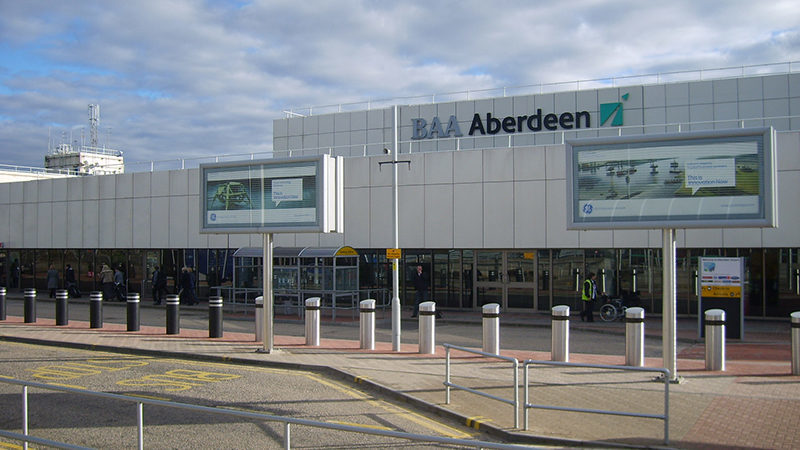
Aberdeen Airport: Wikipedia
Help at the airport: Staff at the airport can organise a familiarisation visit ahead of departure day, allowing a child or adult to get an idea of what to expect on the day of travel. Staff will also explain how they can help on the day.
Get in touch with the team to organise a familiarisation trip by emailing abzadm@aiairport.com
Lanyards: Aberdeen Airport is happy to provide its green lanyard or card to help key staff discreetly identify travellers with hidden disabilities.
Email abzadm@aiairport.com ahead of departure day, or visit the Assistance Desk at the airport on arrival.
Downloadable aids: The airport has a downloadable ‘Airport Experience Guide for Children’. This helps youngsters with Autism Spectrum Disorder (ASD) prepare for their trip through the airport terminal. Download the guide here
Airport information page: Airport information page: See the airport’s information page for details on travelling with children and adults with ASD. Find the Aberdeen Airport information page here.
Birmingham Airport
Birmingham Airport has worked closely with Autism West Midlands and its special service provider OCS to create a favourable environment for kids and adults with Autism Spectrum Disorder (ASD). Birmingham Airport is also an Autism Friendly Award winner.
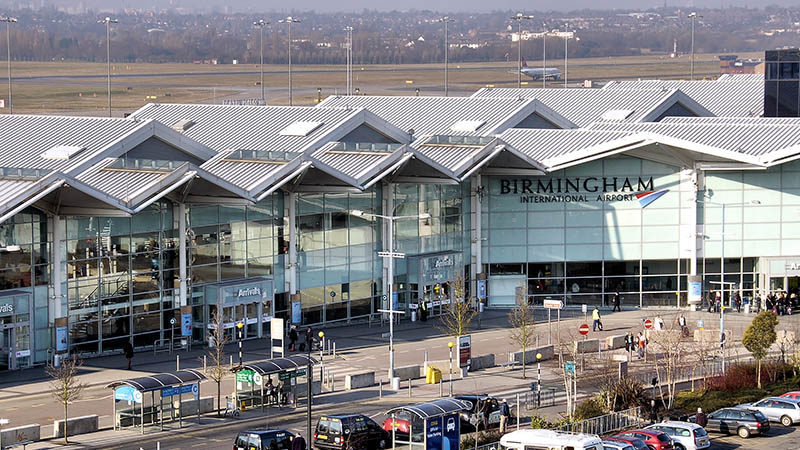
Birmingham Airport: Image credit
Help at the airport: Birmingham Airport works with its special assistance provider OCS to offer help within the terminal. Research from the Civil Aviation Authority states that pre-travel familiarisation visits are available at Birmingham Airport – give OCS a call on 0121 767 7878 for more information.
Lanyards: Anyone with a hidden disability can ask for a Sunflower Lanyard to help ease the stress of their journey through the terminal. These can be collected from the OCS Helpdesk on the ground floor of the Terminal Building opposite Spar.
Downloadable aids: Birmingham Airport has worked with Autism West Midlands to produce downloadable booklets and a video to help those with ASD before they travel to the terminal.
https://www.youtube.com/watch?v=hmYMRNsUFZA?rel=0
Airport information page: See the airport’s information page for details on travelling with children and adults with ASD.. Visit the Birmingham Airport page here.
Belfast International Airport
Belfast International Airport has pledged to help turn a ‘daunting experience into a memorable one’ for children and adults with Autism Spectrum Disorder (ASD).
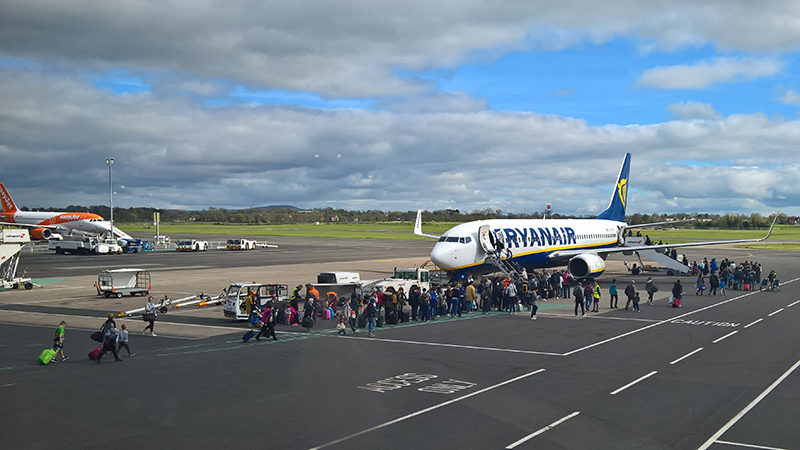
Belfast International Airport: Wikipedia
Help at the airport: Familiarisation visits to the airport will be considered. Get further information on this by emailing feedback@bfs.aero. Additionally, the staff at Belfast International Airport work with specialist assistance provider OCS.
Lanyards: The airport’s green lanyards can be collected at the airport. Staff have been trained to recognise these lanyards and understand that holders might need more time to process information or prepare for security screening. Airport staff will also be aware that passengers with the lanyard will need to remain with family and friends. The lanyard does not grant access to the fast-track security lane. These can be booked for a cost at airports across the UK when not offered with the special assistance package.
The lanyards can be collected on the day of travel from the OCS Special Assistance desk in the check-in area. Get more information by emailing autism@bfs.aero or downloading a guide here.
Downloadable aids: Belfast International Airport has produced downloadable booklets for children and adults with ASD.
Airport information page: See the airport’s information page for details on travelling with children and adults with ASD.. Find out more from Belfast International Airport.
Bournemouth Airport
Bournemouth Airport has a reputation for being a ‘friendly’ place that recognises the issues travelling through airports may raise for children and adults with Autism Spectrum Disorder (ASD). To help make the experience less stressful, the airport works with Autism Wessex to ensure staff have an insight into the best ways to assist children and adults with autism.
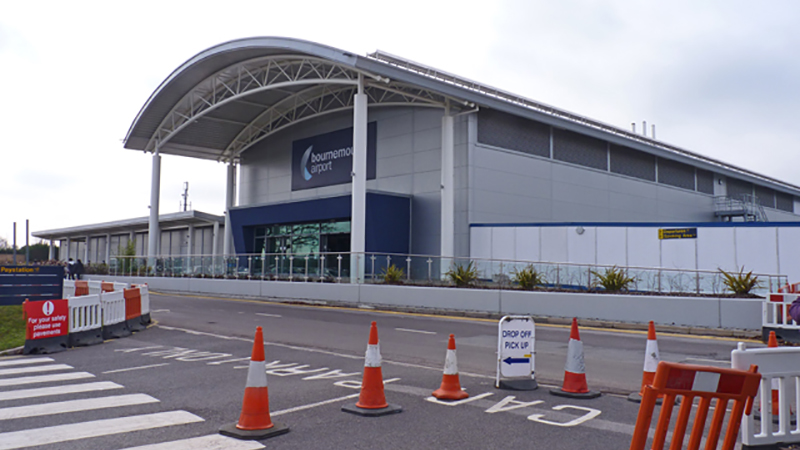
Bournemouth Airport: Mike Smith
Help at the airport: Passengers on the Autistic Spectrum can book a familiarisation trip to Bournemouth Airport. The tours of the airport terminal take place from November to February and can be tailored to passengers’ needs. The trips for those with ASD are organised through Autism Wessex www.autismwessex.org.uk 01202 483360.
Lanyards: Passengers with hidden disabilities are offered the opportunity to use the airport’s Assistance Lanyard, which helps staff recognise passengers with the autism – and offer them assistance.
For more information on obtaining lanyards, call the helpdesk on 07534988571.
Downloadable aids: Bournemouth Airport has produced an accessibility guide to the airport. This can be downloaded here.
Airport information page: See the airport’s information page for information on travelling with children with ASD. Find out more from Bournemouth Airport.
Bristol Airport
Bristol Airport has ensured all customer-facing staff have completed a full training and awareness programme to help passengers with hidden disabilities such as autism.

Bristol Airport: image credit
Help at the airport: Bristol Airport gained an Autism Friendly Award after a project to improve assistance for passengers with hidden disabilities. The award – from the National Autistic Society – recognises Bristol Airport and OCS Group for providing assistance that improves the experience at the airport for autistic passengers, their families and caregivers.
Lanyards: Along with a lanyard, Bristol Airport offers a Hidden Disabilities card. Both of these help passengers with Autism Spectrum Disorder (ASD) to progress through the terminal. The card acts as a discreet sign to airport staff that passengers may need additional support as they travel through the airport. The card can be handed discreetly to staff along with the passenger’s boarding pass or passport. This will let staff know that holders may need more time to process information, help in avoiding crowded places or extra assistance when reading information screens, for example. The card also encourages airport staff to use clear language when interacting.
Downloadable aids: Bristol Airport offers a booklet to help children and adults with ASD learn what to expect when negotiating the airport terminal. Download the booklet here.
https://www.youtube.com/watch?v=KXyoQiHqK8E?rel=0&showinfo=0
Airport information page: See the airport’s information page for information on travelling with children with ASD. Find out more from Bristol Airport here.
Doncaster Airport
Travelling through an airport can be stressful for kids or adults with autism, but Doncaster Robin Hood has put measures in place to help ease the anxiety of progressing through the terminal.
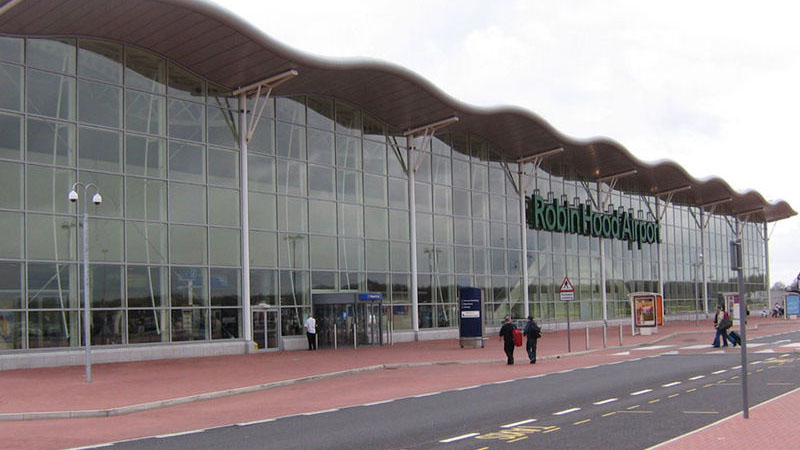
Doncaster Robin Hood Airport: Wikipedia
Help at the airport: Doncaster Airport works with the charity Autism Plus to help provide training for frontline staff. Just ask if you need assistance. Familiarisation visits are also available, according to CAA documentation. Get in touch with the airport for more details by emailing customerservices@flydsa.co.uk.
Lanyards: There are no lanyards, but passengers with Autism Spectrum Disorder (ASD) can obtain a discreet white and blue Hidden Disability Awareness Wristband. These will be recognised by frontline staff who’ll help ensure that passengers are given the assistance they require. The airport does point out that the wristbands – available for kids and adults – do not grant free-of-charge admission to fast-track security.
The Hidden Disability Awareness Wristband can be obtained by contacting customerservices@flydsa.co.uk with your flight number, date of departure, quantity and the size required.
Downloadable aids: Travellers with hidden disabilities can download a PDF explaining what to expect at the airport and giving advice on how to progress through the terminal as smoothly as possible. The guide can be downloaded here.
Airport information page: See the airport’s information page for details on travelling with children and adults with ASD. Visit Doncaster Airport’s website here.
Durham Tees Airport
No information supplied. We have approached the airport but have not received a reply.
East Midlands Airport
Anyone with hidden disabilities can expect warm welcome at East Midlands Airport with a number of initiatives in place to help make the terminal experience less overwhelming.
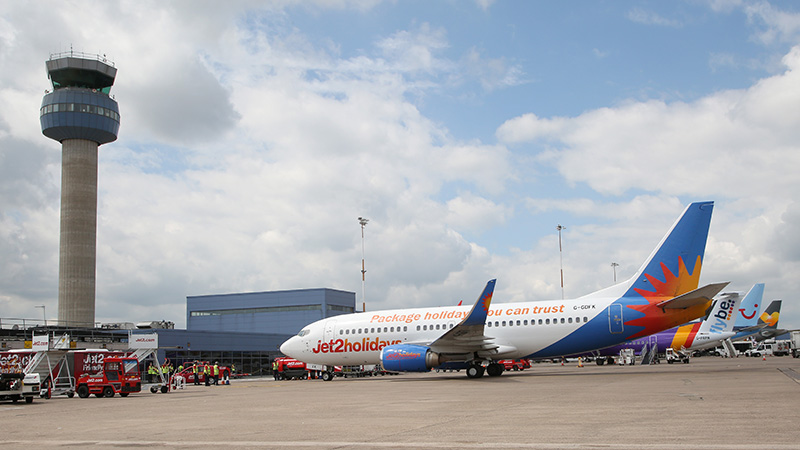
East Midlands Airport: EMA
Help at the airport: Children with Autism Spectrum Disorder (ASD) can visit East Midlands Airport before they fly. The Try Before You Fly visits happen once a month and let kids familiarise themselves with the airport layout and procedures. Upcoming dates for the Try Before You Fly visits and contact details can be found here.
Lanyards: East Midlands Airport has replaced its wristbands with lanyards to help staff recognise passengers with hidden disabilities. They can be obtained free of charge from the Passenger Service Desk in the check-in hall. You can also request a lanyard ahead of the day travel by emailing paxservicesteamleader@eastmidlandsairport.com.
Downloadable aids: Along with a downloadable booklet to familiarise children with terminal procedures, parents and carers can download a Special Assistance Passport. This includes details that can help staff get to know the special needs of passengers with hidden disabilities.
Airport information page: See the airport’s information page for details on travelling with children and adults with ASD. Find out more from East Midlands Airport’s website here.
Edinburgh Airport
Edinburgh became the first airport in Scotland to receive the Autism Friendly Award. This awarded in recognition of the accessible and supportive environment created to assist autistic travellers.
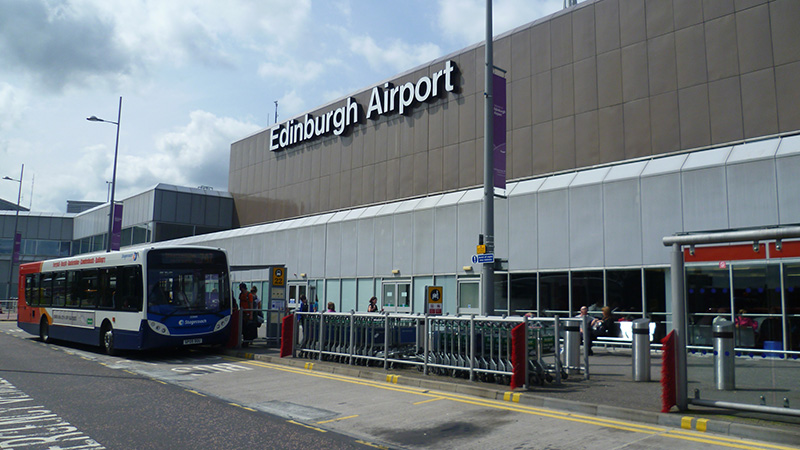
Edinburgh Airport: Wikipedia
Help at the airport: Children and adults on the autism spectrum can find air travel stressful, but to help prepare for their trip, Edinburgh Airport offers a familiarisation trip to the terminal. The visits do not include after-security areas or visits to aircraft. More details about these visits can be obtained by emailing additionalneeds@edinburghairport.com with your preferred date and time.
Lanyards: Edinburgh Airport offers lanyards and pins to discreetly let staff know the wearer may need extra time or help with elements of the terminal experience. The lanyards and pins can be collected at the airport’s Special Assistance Reception on the day of travel, or sent by post beforehand.
Downloadable aids: Edinburgh Airport has a downloadable guide to look at travelling through the airport on departure and return. This can be downloaded here.
The airport’s website also has a video that kids with Autism Spectrum Disorder (ASD) can watch, but for some reason, it requires users to enter a password before the video can be watched. Should you wish to watch the video you’ll need to email additionalneeds@edinburghairport.com for the password and then head here for the video. Alternatively, you can watch the video – Suzie Goes On An Aeroplane – without a password below!
You can also request the Suzie books are posted out to you by emailing the above address.
https://www.youtube.com/watch?v=ZiMG7PR0BCw?rel=0&showinfo=0
Airport information page: See the airport’s information page for details on travelling with children and adults with ASD. Find out more from Edinburgh Airport’s website.
Exeter Airport
Here’s what passengers with Autism Spectrum Disorder (ASD) can expect when travelling from the popular Devon airport.
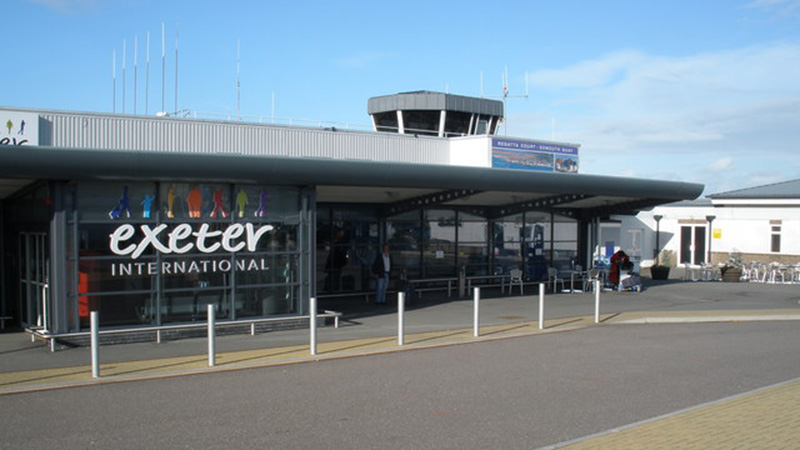
Exeter Airport: Roger Cornfoot
Help at the airport: Children or adults on the autistic spectrum can book a guided familiarisation tour of Exeter Airport. These can be arranged by contacting the airport at least two weeks before the day of travel. Request a visit by emailing assistance@exeter-airport.co.uk or calling 07896 168 326.
Lanyards: Exeter Airport can provide lanyards to discreetly alert staff to passengers with hidden disabilities. The lanyards are obtained from the Assistance Desk.
Downloadable aids: Exeter Airport does not have any downloadable visual aids at present.
https://www.youtube.com/watch?v=DOJm6qpO-6c?rel=0&showinfo=0
Airport information page: See the airport’s information page for details on travelling with children and adults with ASD. Find out more from Exeter Airport’s website.
Gatwick Airport
Gatwick works with a number of charities – such as the National Autism Society – to help ensure travelling through its terminals is as stress-free as possible. The airport also has ‘Airport Autism Champions’ to help with ongoing training for frontline staff.
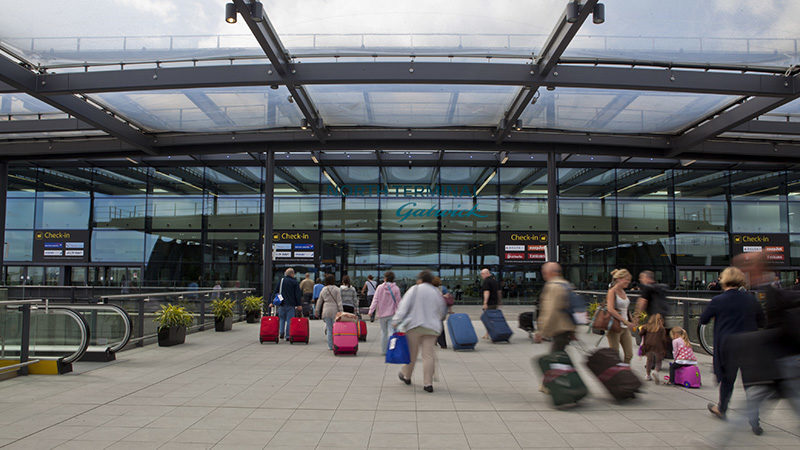
Gatwick Airport North Terminal: LGW
Help at the airport: Gatwick Airport does not offer official familiarisation visits to its terminals, but it does advise taking a trip to the public areas of the airport ahead of departure day.
Lanyards: Gatwick Airport launched its lanyard scheme in 2016, allowing staff to recognise travellers who have a hidden disability and may need a little extra help or time to process information. The lanyard covers all hidden disabilities, so it’s advised you speak to a member of staff if you have specific requirements.
To pick up a lanyard, head to one of the Assistance Reception desks, where staff will provide one even if you haven’t requested or need special assistance. The desks are located both before and after security. Get more information by emailing HiddenDisability@gatwickairport.com
Downloadable aids: Gatwick Airport offers an autism-friendly guide to travelling through the terminals. The visual guide can be downloaded here.
Airport information page: See the airport’s information page for details on travelling with children and adults with Autism Spectrum Disorder (ASD). Find out more from Gatwick Airport’s website.
Glasgow Airport
Travellers with Autism Spectrum Disorder (ASD) are welcomed at Glasgow Airport, with the airport urging passengers, parents or carers to make contact ahead of their flights to find out about the help available when travelling through the terminal.
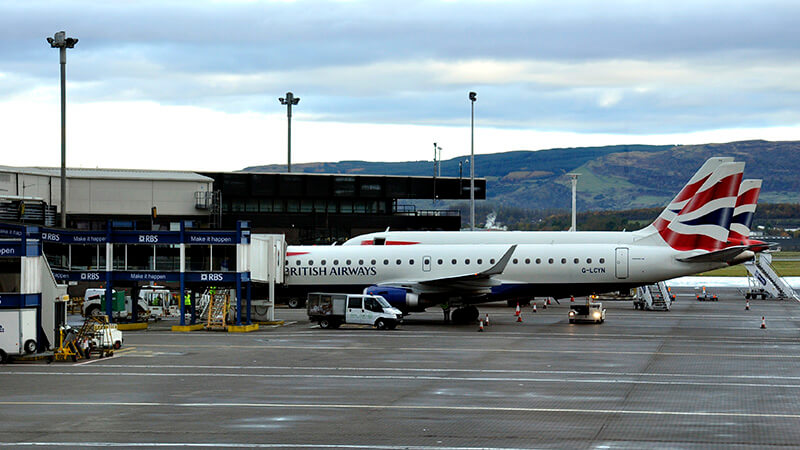
Glasgow Airport:Image credit
Help at the airport: Glasgow Airport offers the chance for children and adults with ASD to take a tour of the airport before they travel to help prepare for the big day. Contact Jim Lobban on jim.lobban@ocs.co.uk for details on how to book one of these trips.
Lanyards: If you or someone you’re travelling with has a hidden disability, airport teams will provide a lanyard which will discreetly identify them to airport staff as requiring additional support. Frontline security staff have been trained to recognise these and offer additional care and support during the search process. Pick up a lanyard at the special assistance desk on the ground floor in the main check-in area.
Downloadable aids: Glasgow Airport offers an autism-friendly guide to travelling through the terminals. The visual guide can be downloaded here.
Airport information page: See the airport’s information page for details on travelling with children and adults with ASD. Find out more here.
Heathrow Airport
As the UK’s busiest airport, travelling through its terminals can be a daunting prospect for children or adults with Autism Spectrum Disorder (ASD), but passengers can look out for specially trained staff to help them out. These airport employees can be identified by badges – such as the Helping Hands symbol which you can see here. The airport works with The National Autistic Society and Autism West Midlands to help improve its service for those with hidden disabilities.
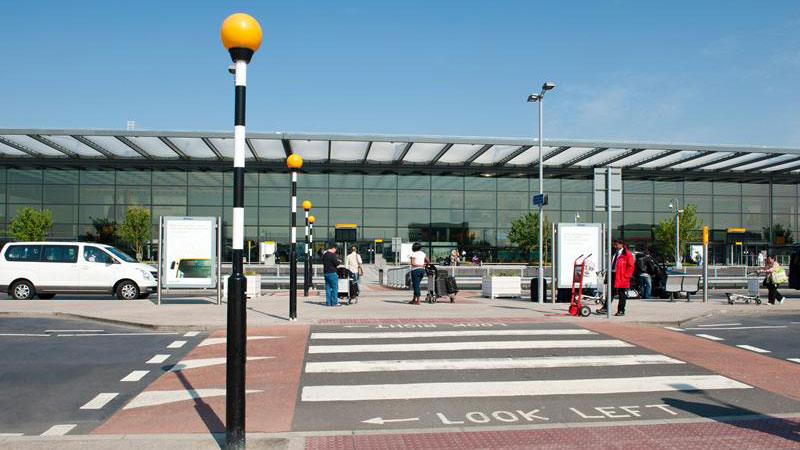
Heathrow Airport Terminal 4
Help at the airport: Heathrow Airport produces guides for ‘anxious’ travellers, which cover all four terminals, with both departures and arrivals catered for. These downloadable guides include quiet areas to relax, as well as details on where you can find help in the airport if you require assistance. The guides are not specifically designed for children or adults on the autism spectrum (see below) but could provide a useful additional resource. Download them here:
|
Arrivals Terminal 2 arrivals guide (4MB PDF) Terminal 3 arrivals guide (4MB PDF) |
Departures Terminal 2 departures guide (4MB PDF) Terminal 3 departures guide (4MB PDF) |
Lanyards: Staff have been trained to recognise the airport’s Sunflower Lanyards and provide help and support during all stages of the airport journey.
The Sunflower Lanyards should be obtained ahead of arrival at the airport. Get yours by emailing special_assistance@heathrow.com and providing a postal address to send it to.
Downloadable aids: Along with the guides for anxious travellers, Heathrow Airport has produced an Autism-specific leaflet. This gives tips on navigating the terminals and includes a cut out card that can be completed with specific details of any behavioural or communication issues that can then be communicated with staff. Download the autism-specific leaflet here.
Airport information page: See the airport’s information page for details on travelling with children and adults with ASD. Find out more from Heathrow Airport’s website.
Leeds Bradford Airport
Here’s what passengers with Autism Spectrum Disorder (ASD) can expect when travelling from Leeds Bradford Airport.
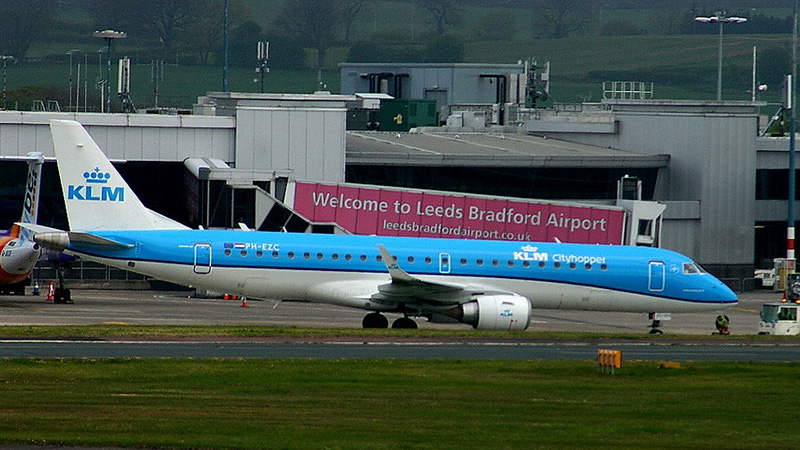
Leeds Bradford Airport: Ian Gratton
Help at the airport: Give the assistance desk a ring before you travel to discuss any issues you’re concerned about. Contact the special assistance team on 0113 391 1607 or email on prm@lba.co.uk.
Lanyards: A lanyard is available to act as a discreet sign to airport staff that the wearer may need additional support or help as they travel through the airport. This can mean more time to prepare for check-in and security, or allowing passengers to remain with their family or friends. The lanyard can be used on the return to Leeds Bradford. It does not offer is fast-track security or priority clearance.
Downloadable aids: Passengers with ASD, parents and carers, can download a visual guide detailing the process of passing through the airport. Download the guide here.
Airport information page: See the airport’s information page for details on travelling with children and adults with ASD. Find out more on the airport’s website.
Liverpool John Lennon Airport
Here’s what passengers with Autism Spectrum Disorder (ASD) can expect when travelling from Liverpool John Lennon Airport.
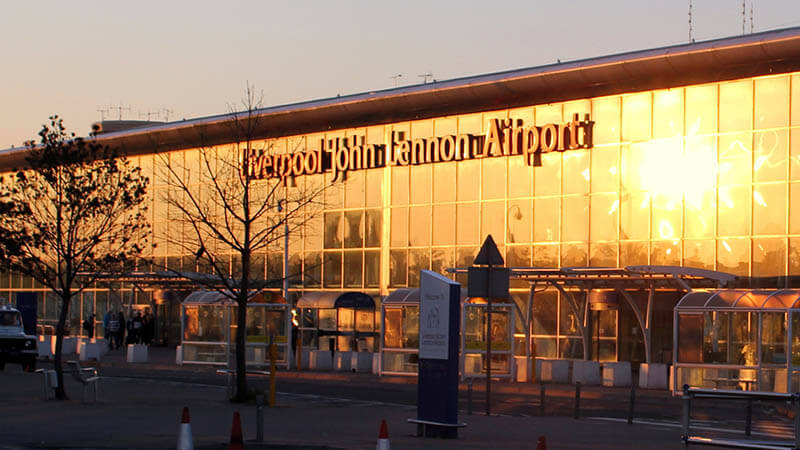
Liverpool John Lennon Airport: Image credit
Help at the airport: Air travel can be daunting for those with hidden disabilities, but Liverpool John Lennon Airport has help at hand. Just get in touch with the airport’s special assistance team for more information if you have any concerns. The team can be contacted on customerservices@liverpoolairport.com ahead of your departure.
Lanyards: Travellers with ASD can obtain an Autism Awareness Voucher to help them through security – either alone or with help from a Special Assistance provider. If you’d like one of these voluntary vouchers, contact customerservices@liverpoolairport.com with your flight number and departure date. The vouchers won’t entitle the holder to a fast-track ticket through security.
Downloadable aids: Liverpool John Lennon Airport has produced a guide to travelling through the terminal process for passengers who may be anxious about what’s to come. Download the guide designed to ease anxiety here.
Airport information page: See the airport’s information page for details on travelling with children and adults with ASD. Find out more on the airport’s website.
London City Airport
Here’s how passengers with Autism Spectrum Disorder (ASD) can get a little help when travelling through London City Airport.
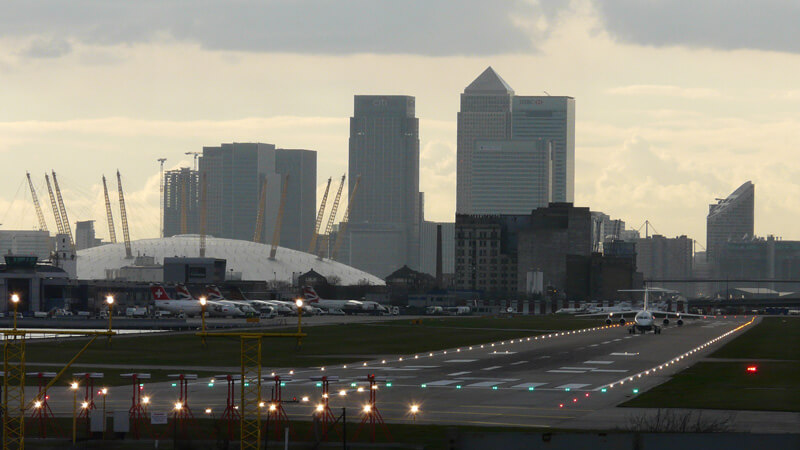
London City Airport: image credit
Help at the airport: If required, you can email assistance@londoncityairport.com and the team will arrange for a member of the team to meet and accompany your party through the terminal to your departure gate.
The airport also hosts open days, helping passengers with ASD familiarise themselves with the airport journey before they travel. These visits – put together with the National Autistic Society and parents of children on the autism spectrum – are designed to give a better understanding of airport processes, from check-in and security to departures and boarding.
If you’re interested in attending the next visit, contact London City Airport at assistance@londoncityairport.com
Lanyards: If you, or someone you’re travelling with requires assistance in the terminal, you can request a special lanyard to wear. This will allow London City Airport staff to recognise those who might need extra help as they travel through the likes of check-in and security. You can pick up one of the lanyards from the Information Desk at the Terminal building.
Downloadable aids: London City Airport has created a booklet called ‘Travelling through London City Airport’, which provides a guide to the various stages of the ‘airport journey’ from arriving, to boarding and then from landing to leaving the terminal. The booklet can be picked up at the airport Information Desk in the Terminal building or by downloading it here.
Airport information page: See the airport’s information page for details on travelling with children and adults with ASD. Find London City Airport’s information page here.
Luton Airport
Here’s are the measures in place to assist passengers with Autism Spectrum Disorder (ASD) as they travel through Luton Airport.
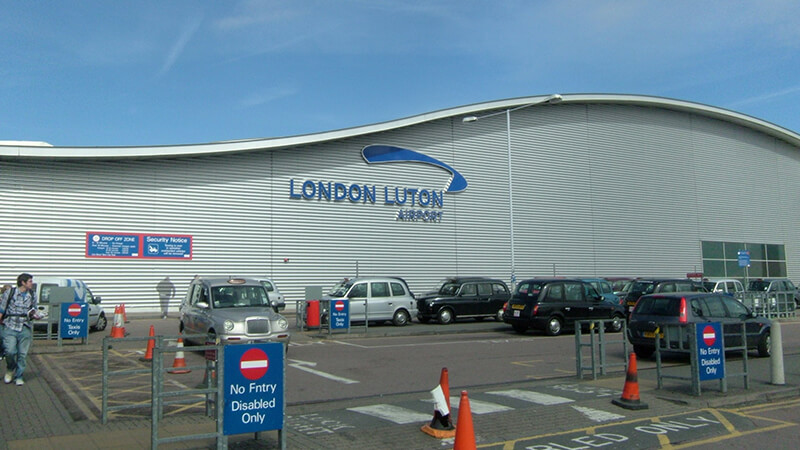
Luton Airport: image credit
Help at the airport: Luton Airport works with the National Autism Society to help improve the journey through the airport for passengers on the Autism Spectrum. Travellers with hidden disabilities and their companions can use the security lane designated for passengers with reduced mobility for faster progress through queues. There’s also a private search area, should this be required. These are currently located at Lanes 1 and 2 of the Security area – but this could differ due to operational reasons.
Once through security, passengers with ASD can wait with their party in the Special Assistance waiting area. This is a public space, but is located in a more secluded area. Follow signs from the main departure lounge.
Lanyards: Luton Airport offers hidden disability stickers to help frontline staff recognise passengers who may require additional help or time when progressing through the terminal. The stickers can be obtained from the Special Assistance desk on your arrival at the airport.
Downloadable aids: Guides covering arrival at the airport and travelling through security can be downloaded to help passengers with hidden disabilities feel more prepared when they arrive at Luton Airport.
Airport information page: See the airport’s information page for details on travelling with children and adults with ASD. Find out more from the airport’s website here.
Manchester Airport
Manchester Airport offers assistance to passengers with Autism Spectrum Disorder (ASD) at all three terminals – including use of family and priority lanes at security.
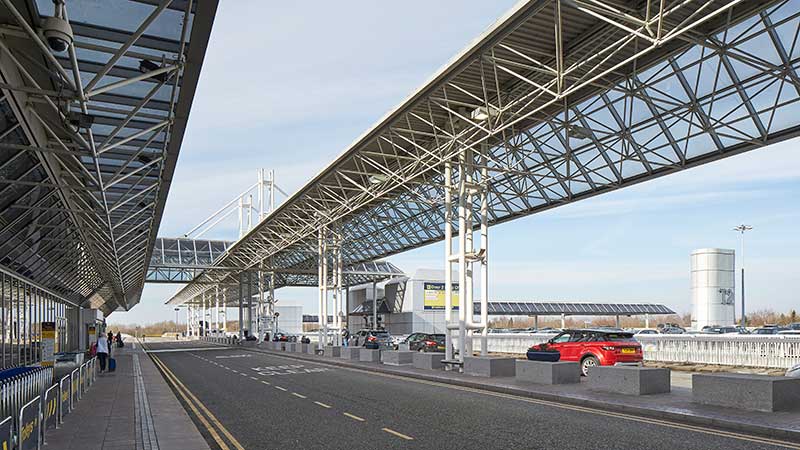
Manchester Airport
Help at the airport: Passengers with ASD will not be separated from companions when making their way through the airport terminals.
Lanyards: Sunflower Lanyards can be obtained at all terminals – speak to the information desks – and provide wearers and companions access to family and priority lanes at security. They also allow use of special assistance lanes at the UK Border on arrival into Manchester Airport.
Downloadable aids: Manchester Airport says it doesn’t ‘have any brochures which you can download’ on its website. Some older guides exist online, but these are out of date.
Airport information page: See the airport’s information page for details on travelling with children and adults with ASD. See more information here.
Newcastle Airport
Here are some of the measure Newcastle Airport has implemented to ease the journey through its terminal for travellers on the Autism Spectrum.
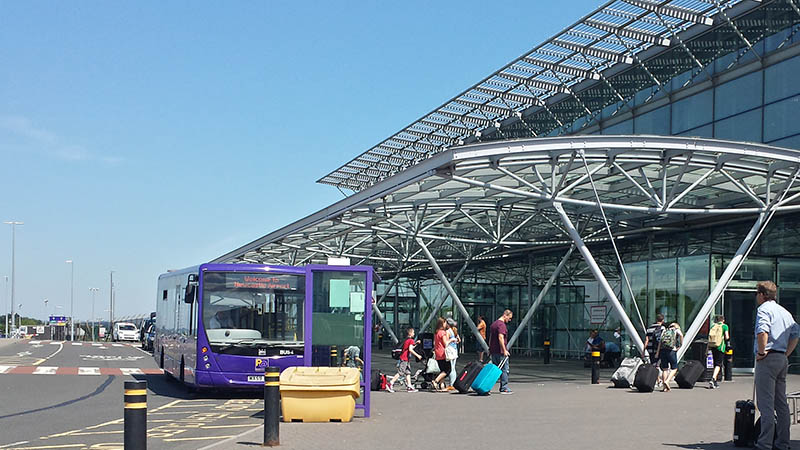
Newcastle Airport: Image credit
Help at the airport: Once through security there are quieter seating areas where families or groups travelling with autistic passengers can wait to board. These include a dedicated area located behind the Dixons Travel store, as well as an assistance gate.
Pre-travel visits can also be arranged – contact Newcastle Airport here for more information.
Passengers with Autism Spectrum Disorder (ASD) will not be separated from travelling companions.
Lanyards: Rather than offering a lanyard, Newcastle Airport provides a downloadable ‘Autism Passport’ which allows the holder and their companions to use the fast-track security lane to cut down on the time spent queuing. Simply download the ‘Autism Passport’ and take the completed document to the PRM assistance desk (located in between check in desk 32 and WHSmith) where it will be validated for use in the security hall. The Autism Passport can then be shown to staff at the security boarding card check point.
Downloadable aids: Newcastle Airport has worked with the North East Autism Society to produce these downloadable booklets.
Travel Advice
My Airport Journey
Airport Activity Book
Airport information page: See the airport’s information page for details on travelling with children and adults with ASD. Find out more on the Newcastle Airport website here.
Southampton Airport
Passengers with Autism Spectrum Disorder (ASD) can expect the following assistance when travelling through Southampton Airport.
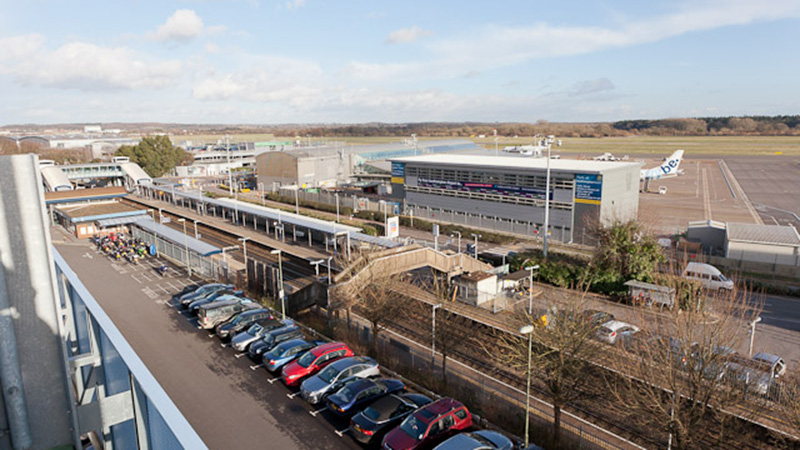
Southampton Airport: Peter Facey
Help at the airport: Adults or children on the Autism Spectrum can visit landside areas of the airport ahead of their departure to help ease stress on the day. Contact the Airport Ambassadors on SOUAmbassadors@southamptonairport.com to organise an escorted visit.
On the day of travel, passengers with autism can register with the Special Assistance team who’ll then guide their party through the airport’s ‘Quiet’ route. Where possible, Southampton Airport will open up a separate check-in desk and security lane.
Lanyards: Southampton offers a green ‘Helping Hands Lanyard’ which teams have been trained to recognise and where required offer additional support throughout the airport journey. The lanyard can be obtained at the Special Assistance desk.
Passengers with hidden disabilities who’ve registered with Special Assistance teams or are wearing a lanyard will not be separated from their travelling party when passing through the airport.
Downloadable aids: Southampton Airport offers a downloadable guide with further information and maps. Download the guide here.
Airport information page: See the airport’s information page for details on travelling with children and adults with ASD. Find out more here on Southampton Airport’s page.
Southend Airport
Here are some of the measures Southend Airport has introduced to help travellers with Autism Spectrum Disorder (ASD) enjoy a smoother journey through the terminal.
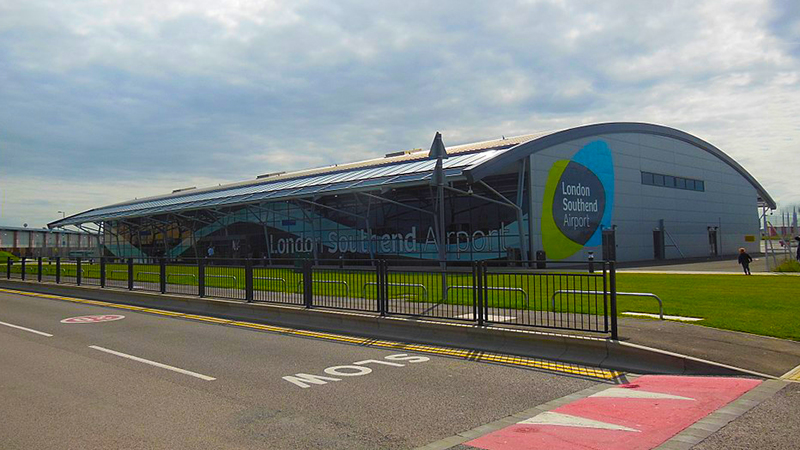
Southend Airport
Help at the airport: Key staff at Southend Airport have received specialist training to help ensure passengers with hidden disabilities can pass through the terminal with as little stress as possible.
Civil Aviation Authority (CAA) documentation states Southend Airport offers pre-travel familiarisation visits to the airport. Contact the team at LSAenquiries@SouthendAirport.com for more information.
Southend does not have a ‘quiet route’, according to the CAA research.
Lanyards: If you have a hidden disability, or are travelling with someone who has, Southend Airport can provide a discreet blue wristband to alert staff that additional support might be required. The wristbands are free and available from the ticket desk in the terminal building.
Downloadable aids: Find out more with the Southend Airport’s downloadable leaflet here.
Airport information page: See the airport’s information page for details on travelling with children and adults with ASD. Find out more here.
Stansted Airport
Here are some of the measures Stansted Airport has put in place to help travellers with Autism Spectrum Disorder (ASD) experience a smoother trip through the terminal.
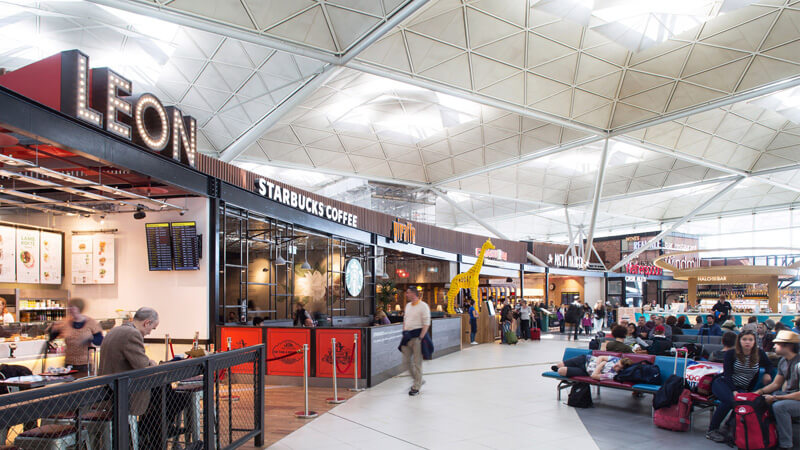
Stansted Airport
Help at the airport: Stansted Airport has introduced its Autism Awareness Scheme, which entitles the person needing special assistance, and their immediate family, access to the Fast Track lanes free of charge. This will help cut queueing times going through security and passport control.
Lanyards: Passengers with hidden disabilities, such as autism, can order a ‘Special Flyer Wristband’, helping staff to recognise the passenger as someone who might require a little extra help or time at various stages of the airport journey.
Passengers requiring the wristband and other assistance must complete a short form here at least five days before their departure date.
Downloadable aids: Find out more about how to enjoy a smooth journey through security and booking assistance here.
Airport information page: See the airport’s information page for details on travelling with children and adults with ASD. Find more here on the Stansted Airport website.
How was your airport? Have you had a good or bad experience?
If you or a traveller you know suffers from Autism Spectrum Disorder (ASD), let us know about your experience at UK airports by filling in this form.
Don’t worry, we won’t ask your name or any personal details and simply want your verdict on how airports are doing – with the goal of helping improve the journey through all terminals.
Find out what support airlines offer to ASD travellers here.
FAQs
Yes, many UK airports have facilities and support for passengers with autism. These may include quiet rooms, sensory packs, and trained staff who are able to assist with any specific needs. For more information check the tab for each airport above.
If you need support for your autistic child at the airport, it is recommended that you contact the airport in advance to inform them of your requirements. You may also need to inform your airline, as they may be able to provide additional assistance during the flight. Follow the info above for exact details for each airport
Yes, many UK airports have quiet rooms that can be used by passengers with autism or other special needs. These rooms are usually located in a quiet area of the airport and can provide a calm and relaxing environment.
Yes, some UK airports have sensory packs available for passengers with autism. These packs may include items such as headphones, fidget toys, and other items designed to help reduce stress and anxiety.
Yes, you can request additional support from airport staff for your autistic child. This may include assistance with checking in, passing through security, and boarding the plane.

We came home via East Midlands Airport and despite all three of us wearing the sunflower lanyards (My son has ASD and my wife ADHD), we were treated appalingly by both Traveller Assist and Border Force. We might as well not worn the lanyards as they were not taken into consideration by either team, and actually my wife was shouted at which just increased her stress levels and thus her reponse to being shouted at. Absolutely shocked at the poor understanding of hidden disability shown. Will not be flying from their again.
So glad to hear this. However, as person with hyperacusis (ultra sensitivity to noise which often accompanies autism), what if an autistic child in the same quiet lounge just will not shut up screaming? I cannot bear loud noise. You have two special requirements passengers in the same room but with very different needs. I would be forced out into the busy, noisy airport and the autism friendly lounge would not be of any help to me. You almost need a noisy child/family autism lounge as well as a quiet lounge. Or since you allow in travelling companions and families, there is no guarantee they will not be noisy.
east midlands does now have a quiet room landside and airside.